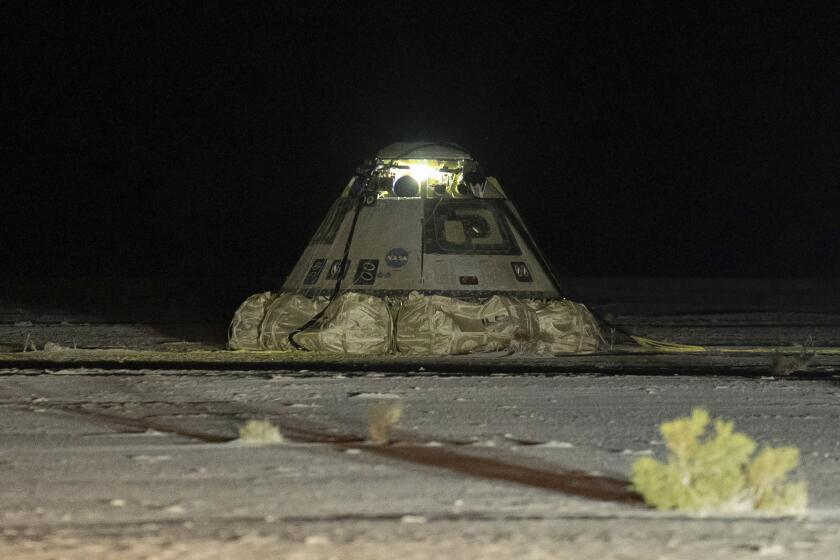Legal Battle Over Detainee Bill Is Likely
The Senate on Thursday approved President Bush’s plan to question and try foreign terrorism suspects before military judges -- without oversight by the federal courts.
Bush is expected to receive a bill he can sign into law in the next few days, but legal challenges almost assuredly will be pursued against the prosecution process, which the administration considers a key element in its war on terrorism.
The measure’s most disputed provision would block foreign prisoners held by the military from turning to the federal courts to end their imprisonment. By preventing detainees from challenging their confinement in court, it sets up a potential constitutional conflict before the Supreme Court.
The Senate by a 51-to-48 vote Thursday rejected a proposal to include this right in the bill establishing rules for the new military tribunal system. The overall bill was then approved, 65 to 34.
The measure is virtually the same as one passed by the House on Wednesday.
The legislative victory for the president came three months after he had suffered a stinging defeat in the Supreme Court. In striking down the plan the White House had devised for putting “unlawful enemy combatants” on trial, the justices ruled that Congress must authorize the process for trying terrorism suspects.
The Republican-led House and Senate not only gave Bush the legal authority he requested, but told the Supreme Court to stay out of the matter, now and in the future.
The bill won passage in the Senate hours after Bush journeyed to Capitol Hill to tell GOP lawmakers that “there’s still an enemy out there that wants to do harm to the United States.”
Slight differences in the Senate version of the bill mean it must be returned to the House, where it is expected to easily win approval today. Republican leaders then plan to forward the bill to the White House with a ceremony on Capitol Hill, in line with the party’s effort to highlight its national security credentials before the November election.
“This legislation will give the president the tools he needs to protect American lives without compromising our core democratic values,” Sen. Tom Coburn (R-Okla.) said.
But some lawmakers, Republicans as well as Democrats, called the move to suspend habeas corpus -- the demand for legal justification of one’s imprisonment -- a historic mistake, and one that could cause the entire bill to be struck down.
“This is wrong; it is unconstitutional; it is un-American,” said Sen. Patrick J. Leahy of Vermont, the top Democrat on the Senate Judiciary Committee.
The judiciary panel’s chairman, Arlen Specter (R-Pa.), said, “Surely as we are standing here, if this bill is passed and habeas corpus is stricken, we’ll be back on this floor again” grappling with a future ruling against it by the Supreme Court.
Still, Specter was one of 53 Republicans who joined 12 Democrats in voting for the final bill. Leahy was among 32 Democrats who opposed it, along with one independent and one Republican -- Sen. Lincoln Chafee of Rhode Island, who is locked in a tough fight for reelection in his Democratic-leaning state.
California Sens. Barbara Boxer and Dianne Feinstein, both Democrats, voted against the bill.
Civil libertarians said they planned to fight the measure in court.
“Congress is now rubber-stamping a bill that was written by the president and gives the president expansive power to detain without judicial oversight,” said Vincent Warren, executive director of the Center for Constitutional Rights in New York. “It will grant the president the privilege of kings.... This unprecedented and expansive suspension of habeas corpus is utterly unconstitutional, and we will challenge it.”
Sen. Lindsey Graham (R-S.C.), a military lawyer who helped write the bill, said federal judges should not be permitted to interfere with the military’s handling of prisoners.
“I don’t believe judges should be making military decisions in a time of war,” he said. “To substitute a judge for the military in a time of war on something as basic as who our enemy is, is not only not necessary under the Constitution, it impedes the war effort.”
The privilege of habeas corpus holds a venerated place in English and U.S. law. The U.S. Constitution says, “The privilege of the writ of habeas corpus shall not be suspended, unless when in cases of rebellion or invasion the public safety may require it.”
But it has long been unclear whether this right extended to foreign prisoners held by the U.S. military. After World War II, the Supreme Court said German war prisoners did not have a right to file writs of habeas corpus to challenge their imprisonment.
Two years ago, the high court reversed course somewhat in a case brought on behalf of detainees at the U.S. military prison in Guantanamo Bay, Cuba. In Rasul vs. Bush, the justices interpreted a 19th century measure passed by Congress as opening the door for judges to hear claims from prisoners held by the military who say they are “wholly innocent of wrongdoing.”
The measure approved by the Senate on Thursday would close that door. The legislation says, “No court, justice or judge shall have jurisdiction to hear or consider an application for a writ of habeas corpus filed by or on behalf of an alien detained by the United States [who] has been determined ... to have been properly detained as an enemy combatant.”
Congress passed a similar restriction in December in the Detainee Treatment Act. But in its decision in June, the Supreme Court interpreted that ban as applying to only new claims, not pending cases that had been filed earlier on behalf of Guantanamo detainees.
Under the new legislation, it would apply to all claims.
It means that detainees at Guantanamo would not be able to challenge their detention there or the rules under which they are tried. However, if a detainee is convicted in a military court, and possibly sentenced to death, he can appeal to the U.S. Court of Appeals for the District of Columbia. If that fails, he could also ask the Supreme Court to review his case.
During the House debate Wednesday, GOP lawmakers made it clear they wanted the bill to prevent the Supreme Court from, in their eyes, hampering the prosecution of suspected foreign terrorists.
“What this does is to say to the Supreme Court, ‘We meant what we said when we passed the law a year ago which said [the ban on habeas corpus] should apply to people already in Guantanamo,’ ” said Rep. Dan Lungren (R-Gold River). “This time we really mean it. Please follow it.”
But Specter on Thursday questioned whether Congress could suspend this right.
“The Constitution is explicit in the statement that habeas corpus may be suspended only with rebellion or invasion. We do not have a rebellion or an invasion,” he said.
The rules for the military trials established by the new measure would generally follow those proposed by the Bush administration. Prosecutors would be able to make use of “hearsay” evidence and confessions that were obtained through coercion, so long as the military judge believed the evidence was reliable.
It is not clear whether the administration plans to try many of its detainees as war criminals. This summer, only 10 of the more than 700 men who have been held at Guantanamo had been charged with war crimes. And none had been tried when the Supreme Court struck down Bush’s plan.
Bush announced Sept. 6 that he had sent 14 “high-value” foreign terrorism suspects to Guantanamo. They had been held in secret prisons run by the CIA. This group include Khalid Shaikh Mohammed, said to be the mastermind behind the Sept. 11 terrorist attacks.
The passage of new bill clears the way for him to be tried. If he were convicted, and possibly sentenced to death, he could appeal his conviction or sentence to the U.S. Court of Appeals for the District of Columbia. If that appeal failed, he could ask the Supreme Court to review his case.
Last week, lawmakers reached a compromise with the president that preserves, at least in principle, the Geneva Convention’s ban on inhumane treatment of prisoners.
Closing the debate, Sen. John McCain (R-Ariz.), a prisoner of war during the Vietnam War who helped draft the measure, said the legislation made clear that the U.S. would fulfill its obligations under the Geneva Convention.
In a choreographed exchange Thursday, McCain, joined by Sens. John W. Warner (R-Va.) and Carl Levin (D-Mich.), said the law did not allow the president to modify the Geneva Convention or to weaken the ban on torture and inhuman treatment passed by Congress last year.
As the details of the bill were hammered out in recent weeks in talks between the White House and GOP lawmakers led by McCain, Graham and Warner, Democrats for the most part stood back and watched. But in this week’s floor debates, Democratic leaders gave fuller voice to their disagreements with the final product.
“I strongly believe this legislation is unconstitutional,” Senate Minority Leader Harry Reid (D-Nev.) said. “It will almost certainly be struck down by the Supreme Court. And when that happens, we’ll be back here several years from now debating how to bring terrorists to justice. I am convinced that future generations will view passage of this bill as a grave error.”
richard.simon@latimes.com
Times staff writer Julian Barnes contributed to this report.
More to Read
Sign up for Essential California
The most important California stories and recommendations in your inbox every morning.
You may occasionally receive promotional content from the Los Angeles Times.








